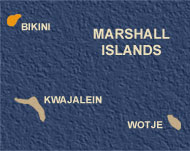Genius who heralded end of humanity
Edward Teller, who has died aged 95, was perhaps the most controversial scientist of the 20th century.

The “father of the hydrogen bomb” died at his home on Stanford University campus on Tuesday after suffering a stroke earlier in the week.
You either loved or hated Edward Teller.
Regarded as a hero by his supporters, he was hailed as one of the most creative scientists who had lived.
Some even said his dogged pursuit of the superbomb ensured the very survival of the United States.
On the other hand, his opponents labeled him a war monger who encouraged the militarisation of the world’s superpowers.
And he managed to alienate much of the scientific community by his autocratic style and his perceived betrayal of colleague Robert Oppenheimer.
Anti-Semitism
Edward Teller was born into a Jewish family in Hungary in 1908.
He grew up during a turbulent time in Hungarian history when the country was ruled by an anti-semitic fascist dictator, Nicholas Horthy.
This meant the young Teller was happy to leave his homeland in 1926 to study in Germany.
However, he soon realised he had jumped from the frying pan into the fire when Hitler began his inexorable rise to power.
So in 1935 Teller emigrated to the United States to take up a teaching position at George Washington University.
Manhatten Project
At the outbreak of the Second World War, he was among the first scientists recruited to work on the Manhattan Project to develop an atomic bomb.
 |
|
The biggest bomb ever exploded |
But unlike his boss, Oppenheimer, Teller showed no remorse at the time when the fruit of their labour devastated Hiroshima and Nagasaki killing hundreds of thousands of people.
A few years later, when the Soviet Union conducted its first atomic test in 1949, Teller did his best to drum up support to build the even more powerful hydrogen bomb.
Teller argued a superbomb was essential to the very survival of America.
“If the Russians demonstrate a ‘super’ before we possess one, our situation will be hopeless,” he said.
Superbomb
President Truman eventually agreed, calling for a hydrogen bomb programme at the end of January 1950.
And on 1 November 1952 Teller saw his dreams fulfilled.
The US detonated a hydrogen bomb in the Pacific that vaporised an entire island.
Even those who had witnessed atomic tests were stunned by the blast – within 90 seconds the fireball had reached 57,000 feet.
The cloud, when it had reached its furthest extent, was about 100 miles wide.
Betrayal
The explosion wiped an island off the face of the planet, and destroyed life on the surrounding islands.
Simply the biggest bomb ever exploded.
But it was Robert Oppenheimer’s security clearance hearings in 1954 that alienated Teller from many of his scientific colleagues.
Oppenheimer had come under scrutiny because of his left-leaning politics and his consistent opposition to the hydrogen bomb.
At Oppenheimer’s hearings, Teller testified that “I feel I would prefer to see the vital interests of this country in hands that I understand better and therefore trust more”.
|
“If the Russians demonstrate a ‘super’ before we possess one, our situation will be hopeless” Edward Teller |
‘War criminal’
The testimony enraged his colleagues who felt it was a terrible betrayal of the loyal Oppenheimer.
From the 1950s Teller continued to be a tireless advocate of a strong defence policy, calling for the development of advanced weapons and continued nuclear testing.
During the Vietnam War his proposals so incensed protesters that some of them labeled him a “war criminal”.
And in the 1980s, he was a vigorous proponent of a new defence system that came to be known as the Strategic Defense Initiative or Star Wars.
Destruction
Edward Teller was undoubtedly one of the most talented scientific minds that had lived.
But he will ultimately be remembered as the creator of the biggest, most destructive device in human history.
And in doing so, he moved the world from an era where weapons were limited in power to one where they actually threatened human existence.